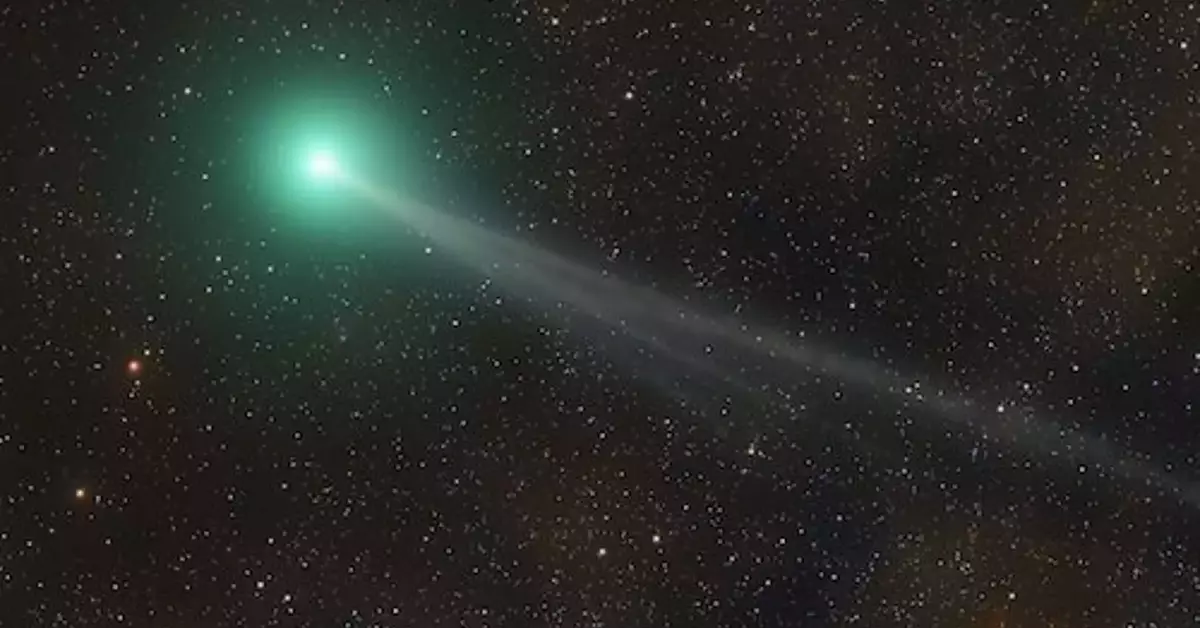Earth, a stew of chaos 4.5 billion years ago, miraculously birthed life. As we dig into the puzzle of life’s beginnings, the question arises: could the rules governing life on Earth extend to the myriad exoplanets scattered across the cosmos? With over 5,500 known exoplanets beyond our solar system, some vastly different from Earth, the chance of life beyond our planet sparks scientific interest. A new study explores the role of comets, those celestial wanderers, in possibly seeding life across the universe.

Life’s Genesis
Life on Earth emerged approximately 3.8 billion years ago, leaving scientists to ponder two possible origins: endogenous, a purely local phenomenon, or exogenous, with a celestial nudge from asteroids or comets. To explore the latter possibility, researchers have examined space rocks, especially comets, finding they contain prebiotic molecules. Notably, the asteroid Ryugu, sampled by Japan’s Hayabusa2 mission in 2020, gave traces of niacin (vitamin B3) and uracil, a basic building block in the expression of genes.
Similarly, the Rosetta mission’s study of Comet 67P/Churyumov–Gerasimenko in 2014 showed glycine, an amino acid found in proteins, and phosphorus, a key component of cell membranes. These results show that comets not only contain prebiotic molecules but may also play a role in concentrating these molecules in specific areas upon impact.
Comets as Cosmic Couriers
Richard Anslow, a Ph.D. astronomy student at the University of Cambridge, leads a team that looks into the relationship between planets and comets in star systems. Their study, published in the journal Proceedings of the Royal Society A Mathematical Physical and Engineering Sciences, focuses on three key qualities: the mass of an exoplanet affected by a comet, the mass of the star it orbits, and the closeness of the exoplanet to its neighboring rocky planets. By applying mathematical models, the researchers aim to uncover the dynamics of comets and planets in star systems.
The Advantage of Cometary Impacts
Anslow and his team suggest a unique advantage of comets in the framework of life’s emergence. The beginning steps of prebiotic chemistry face a challenge in stockpiling the necessary building block molecules, given the inefficiency of the chemistry at low concentrations. Comets, the study suggests, could avoid this problem by sending all their organics into small craters they create upon impact.
This focused distribution of prebiotic molecules may solve the inefficiency problem in the early stages of life’s creation. It offers a method for concentrating important building blocks in localized places on planets, possibly giving a conducive setting for the emergence of life. This novel viewpoint on comets as cosmic couriers opens up new paths for understanding the universal processes that govern life’s beginnings.
The Role of Exoplanets
The study stretches its investigation beyond individual planets, considering the wider context of star-exoplanet systems. By focusing on the mass of the impacted exoplanet, the mass of the star, and the closeness of the exoplanet to its rocky neighbors, the researchers aim to discover trends in the interaction between comets and exoplanets.
ALSO READ: Webb’s Cosmic Odyssey: Unveiling the Celestial Tapestry through NASA’s James Webb Space Telescope
The results could put light on whether the gravitational dynamics within star systems affect the concentration and distribution of prebiotic molecules brought by comets. If so, this would provide further proof for the connection of celestial bodies in the cosmic recipe for life.
Implications for the Universality of Life
The intriguing proposition that comets could play a key role in kickstarting life on exoplanets causes contemplation of life’s universality. With the Milky Way having billions of stars and an even greater number of planets, the chance of life taking root on distant worlds becomes a tantalizing notion.
If the transport of prebiotic molecules by comets is a global event, it suggests that life may not be bound to the familiar conditions of our solar system. Instead, life’s rise could be a cosmic event, affected by the interplay of comets and planets in star systems spread throughout the vast reaches of the universe.
Conclusion
The study led by Richard Anslow and his team adds an intriguing layer to our understanding of life’s possible origins beyond Earth. By studying the dynamics of comets and planets in star systems, the research offers a new viewpoint on how life-building molecules might be transported and focused on faraway worlds.
The idea of bouncing comets as cosmic couriers, delivering the building blocks of life to exoplanets, invites us to consider the possibility of life being a cosmic event. As our exploration of the cosmos continues, the study opens up exciting paths for unraveling the secrets of life’s origin and its possible ubiquity in the vast tapestry of the universe.









